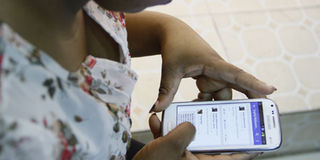Want some good sleep? Stay away from your phone

As smartphone use increased, particularly around bedtime, sleep duration and quality decreased. PHOTO | FILE
What you need to know:
- The researchers note these results may not be representative of the general population. The authors also say iPhones were not used, multiple people could have used a single smartphone and the screen could have been on while a participant was unaware.
- Previous studies have associated exposure to smartphone screens, particularly around bedtime, with poor sleep, but their frequency of use has not been objectively measured and compared to demographics, health information and sleep quality.
SMARTPHONE USE DIRECTLY correlates with sleep, with greater use demonstrating a significant association with shorter sleep duration and worse sleep efficiency, according to researchers from the University of California, San Francisco (UCSF) in the US, the institution wrote on its website on November 9.
In the study, the researchers used a volunteer sample of 653 people with an average age of 42.
As smartphone use increased, particularly around bedtime, sleep duration and quality decreased, says senior author Gregory Marcus.
“Increased screen time in the hour of and after bedtime, but not the hour before, was associated with greater sleep onset latency,” says lead author Matthew Christensen. “This agrees with the notion that screen use just before attempting to fall asleep may be particularly problematic.”
Smartphone screen time was not associated with any change in physical activity level or body mass index. This could be attributable to the multifunctionality of smartphones or their use during physical activities, such as in running apps.
The researchers note these results may not be representative of the general population. The authors also say iPhones were not used, multiple people could have used a single smartphone and the screen could have been on while a participant was unaware.
Previous studies have associated exposure to smartphone screens, particularly around bedtime, with poor sleep, but their frequency of use has not been objectively measured and compared to demographics, health information and sleep quality.
Poor sleep – either quantity or quality – has been shown as a risk factor for obesity, diabetes, cardiovascular disease, depression and overall mortality. Light in the blue spectrum, such as that produced by a smartphone, can suppress production of melatonin, leading to decreased drowsiness, difficulty initiating sleep and non-restorative sleep.





